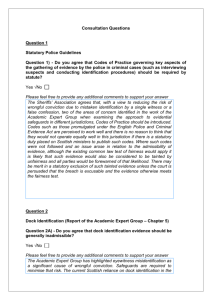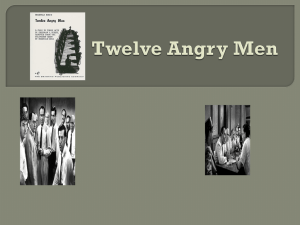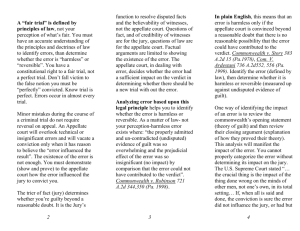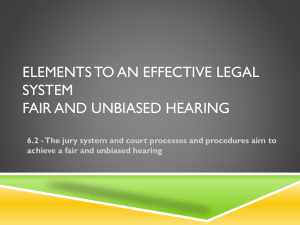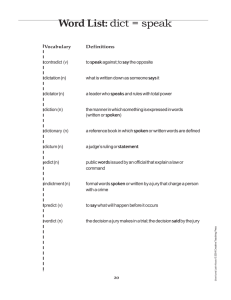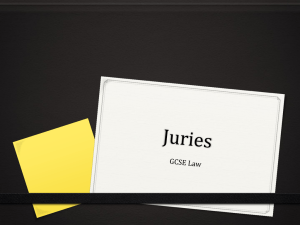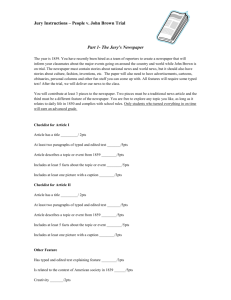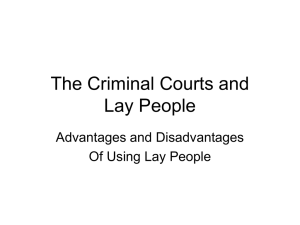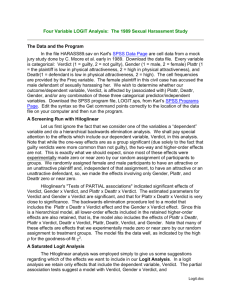Open
advertisement
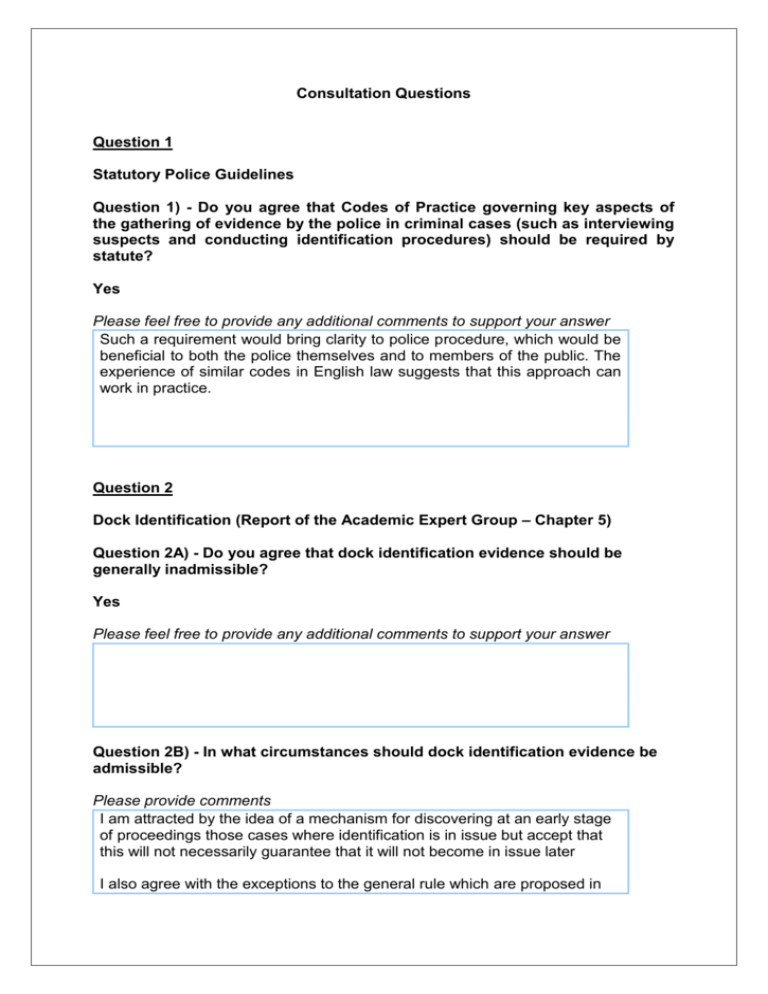
Consultation Questions Question 1 Statutory Police Guidelines Question 1) - Do you agree that Codes of Practice governing key aspects of the gathering of evidence by the police in criminal cases (such as interviewing suspects and conducting identification procedures) should be required by statute? Yes Please feel free to provide any additional comments to support your answer Such a requirement would bring clarity to police procedure, which would be beneficial to both the police themselves and to members of the public. The experience of similar codes in English law suggests that this approach can work in practice. Question 2 Dock Identification (Report of the Academic Expert Group – Chapter 5) Question 2A) - Do you agree that dock identification evidence should be generally inadmissible? Yes Please feel free to provide any additional comments to support your answer Question 2B) - In what circumstances should dock identification evidence be admissible? Please provide comments I am attracted by the idea of a mechanism for discovering at an early stage of proceedings those cases where identification is in issue but accept that this will not necessarily guarantee that it will not become in issue later I also agree with the exceptions to the general rule which are proposed in the Consultation Document. Question 3 Confession Evidence (Report of the Academic Expert Group – Chapter 6) Question 3A) - Should corroboration be required in cases where otherwise a confession would be the sole evidence? Yes Please feel free to provide any additional comments to support your answer Corroboration plays a special role in the context of confession evidence. If an accused could be convicted solely on the basis of a confession then the accused has supplied the entire proof of guilt purely from his own mouth. This is wrong in principle. The prosecution should have to provide independent external evidence which points to the truth of the statement. Question 3B) – Where a confession is corroborated by way of special knowledge, do you consider that the defining characteristic of special knowledge should be: (a) knowledge of a fact or facts relating to the crime which could only be known by the accused if he was the perpetrator; (b) knowledge of a fact or facts relating to the crime which were not in the public domain; (c) some other formulation? Please provide comments If an exception is to be made to the rule proposed in the above answer to allow corroboration by way of special knowledge, it should only apply in situation (a). The law should also continue to be that the making of a special knowledge confession should itself be corroborated. This would be especially necessary if this type of confession extended to situation (b). Question 4 Hearsay Evidence (Report of the Academic Expert Group – Chapter 8) Question 4A) Should corroboration be required in cases where hearsay evidence would be the sole or decisive evidence on which a conviction would be based? Yes Please feel free to provide any additional comments to support your answer This may be a situation where Scots law will have to require corroboration to comply with the ECHR but in any case such a requirement is desirable as a matter of principle. Question 4B) What additional (or alternative) counterbalancing measures should be required where hearsay evidence would be the sole or decisive evidence on which a conviction would be based? Please provide comments None of the proposed counterbalancing measures would be sufficient as an alternative to corroboration. Question 5 Jury Directions (Report of the Academic Expert Group – Chapter 9) Question 5) - Do you have any suggestions as to how jurors should be instructed on the law and how to consider the evidence in a trial? For example, should they be given written instructions from the judge? Please provide comments The use of plain language in instructions to a jury is desirable no matter the medium used to convey the instructions. I accept that there may be practical issues in providing instructions in other than the traditional oral form but I can see no reason why jury trials should refuse to use modern methods of communication (such as those mentioned in the Consultation Document) which are common in everyday life and which jurors would expect as a way of receiving information. Question 6 Recording of Police Interviews (Report of the Academic Expert Group – Chapter 10) Question 6A) - Do you agree with the general principle that all questioning/interviewing of a suspect should be recorded by audio visual means? Yes Please feel free to provide any additional comments to support your answer Question 6B) Do you consider that any breach of the Codes of Practice governing interview procedure should normally result in that evidence being inadmissible? Yes Please feel free to provide any additional comments to support your answer Question 6C) If you answered no, what do you consider should be the test for admitting evidence where the Code has been breached? Please provide comments Comments Question 7 No Case to Answer Submission (Report of the Academic Expert Group – Chapter 12) Question 7A) - Do you agree that the circumstances in which the no case to answer submission can be made should be broadened, and that a judge should be empowered to uphold a submission of no case to answer if he or she considers that no jury or judge acting reasonably could find the charge proved beyond reasonable doubt on the evidence presented? Yes Please feel free to provide any additional comments to support your answer Comments Question 7B) – Should the accused be allowed to make a no case to answer submission at the close of the whole of the evidence? Yes Please feel free to provide any additional comments to support your answer Comments Question 8 Jury Size, Majorities and Verdicts (Report of the Academic Expert Group Chapter 13) Question 8A) – Should a jury be required to strive to achieve a unanimous verdict or is a verdict by a weighted majority acceptable? Verdict by weighted majority Please feel free to provide any additional comments to support your answer A jury is a collective body and the law must supply rules for what constitutes a jury decision/verdict as a collective body. Provided those rules respect the fundamental principles of criminal process, especially the presumption of innocence and proof of guilt beyond reasonable doubt, there is no further need for insisting on, or aspiring to, unanimity. Question 8B) - If you answered “unanimous verdict” to question 8A, what do you think the qualified majority should be, should the jury be unable to reach a unanimous verdict? -1 less than the total number of jurors -2 less than the total number of jurors Other Please feel free to provide any additional comments to support your answer Comments Question 8C) – if you answered “weighted majority” to question 8A, what do you think that weighted majority should be? Other Please feel free to provide any additional comments to support your answer This will depend on the size of the jury. The crucial point is that the rule on the constitution of a jury verdict is fully consistent with the principle of proof of guilt beyond reasonable doubt. There is no mathematical formula for applying this principle but it is suggested that for a jury of 15, there must be at least 12 jurors voting for a conviction; and for a jury of 12 there must be at least 10 voting for a conviction. Question 8D) - Should the same number of jurors as is required for a guilty verdict also be required for an acquittal verdict? No Please feel free to provide any additional comments to support your answer Such a proposal is entirely inconsistent with the presumption of innocence. A criminal trial is concerned with proving the guilt of the accused. It is not concerned with proving his innocence for the presumption of innocence states that he already innocent in the absence of proof of guilt. It is therefore impossible to apply the presumption of innocence to a criminal charge and at the end of the case leave the issue of guilt or innocence undecided. Nor is it a response to this argument to say that until the jury has made its verdict the case against the accused is not complete. In such a situation the trial proceedings may not be complete but the prosecution's case against the accused has ended. Unless the prosecution case has proved the accused's guilt beyond reasonable doubt, the accused is innocent and is entitled to receive an acquittal verdict. That is what the presumption of innocence requires. Question 8E) - Do you agree that the size of a jury in Scotland should be reduced from 15 to 12 persons? No Please feel free to provide any additional comments to support your answer There has been little by way of argument for this change, apart from one of cost savings. However it must be borne in mind that jury trials are few in number so such savings would be marginal. Furthermore serving as a juror is a way in which people can directly participate in the criminal justice system, and having a jury of 15 allows for a larger amount of participation than with a jury of 12. Question 8F) - Do you think there should be 2 or 3 verdicts in criminal trials? 2 Please feel free to provide any additional comments to support your answer We already have only two verdicts in criminal triasl, conviction and acquittal, although there are two names for the acquittal verdict. Since these two forms of acquittal verdict are completely identical, there is no need for two names. Indeed having two different names for the same verdict might suggest, wrongly, that there is a difference in substance between the two. Question 8G) If you answered 2, what should these verdicts be? Guilty and Not Guilty Please feel free to provide any additional comments to support your answer To use the words 'proven' and 'not proven' in a criminal verdict is inappropriate. In Scots law the term 'proof', 'proven' etc relates to facts, which are established (or not established) by evidence. But a trial deals with both facts and law. The jury's function is to apply the law to the facts which they find to have been proved. Their verdict goes beyond proof of facts. A not proven verdict is therefore an incomplete verdict on the question of the guilt or innocence of an accused person. This was the historical origin of the not proven verdict but it was not, as such, a full verdict. The verdict of not proven is a historical anomaly and its existence is inconsistent with the nature of modern criminal trials. The issue in a criminal trial is the guilt of the accused. If guilt has not been established, then the accused is not guilty. The terms guilty and not guilty are more logical than those of proven and not proven. Questions 9, 10 and 11 Additional Comments Question 9) - Do you have any comments to make on proposals raised in the Report of the Academic Expert Group that have not been mentioned in the consultation document? Comments Question 10A) - Do you think there are any additional matters to be considered in relation to safeguards in solemn cases that are not raised in the consultation document or in the Report by the Academic Expert Group? Comments Question 10B) - Do you think there are any additional matters to be considered in relation to safeguards in summary cases that are not raised in the consultation document or in the Report by the Academic Expert Group? Comments Question 11) - Do you believe that there would be any unforeseen consequences arising from the changes discussed in the consultation document or the Report of the Academic Expert Group? These could be in relation to any aspect of the criminal justice system, for example the effect of any possible changes identified on the position of victims and witnesses. If so, what might these be? Comments
